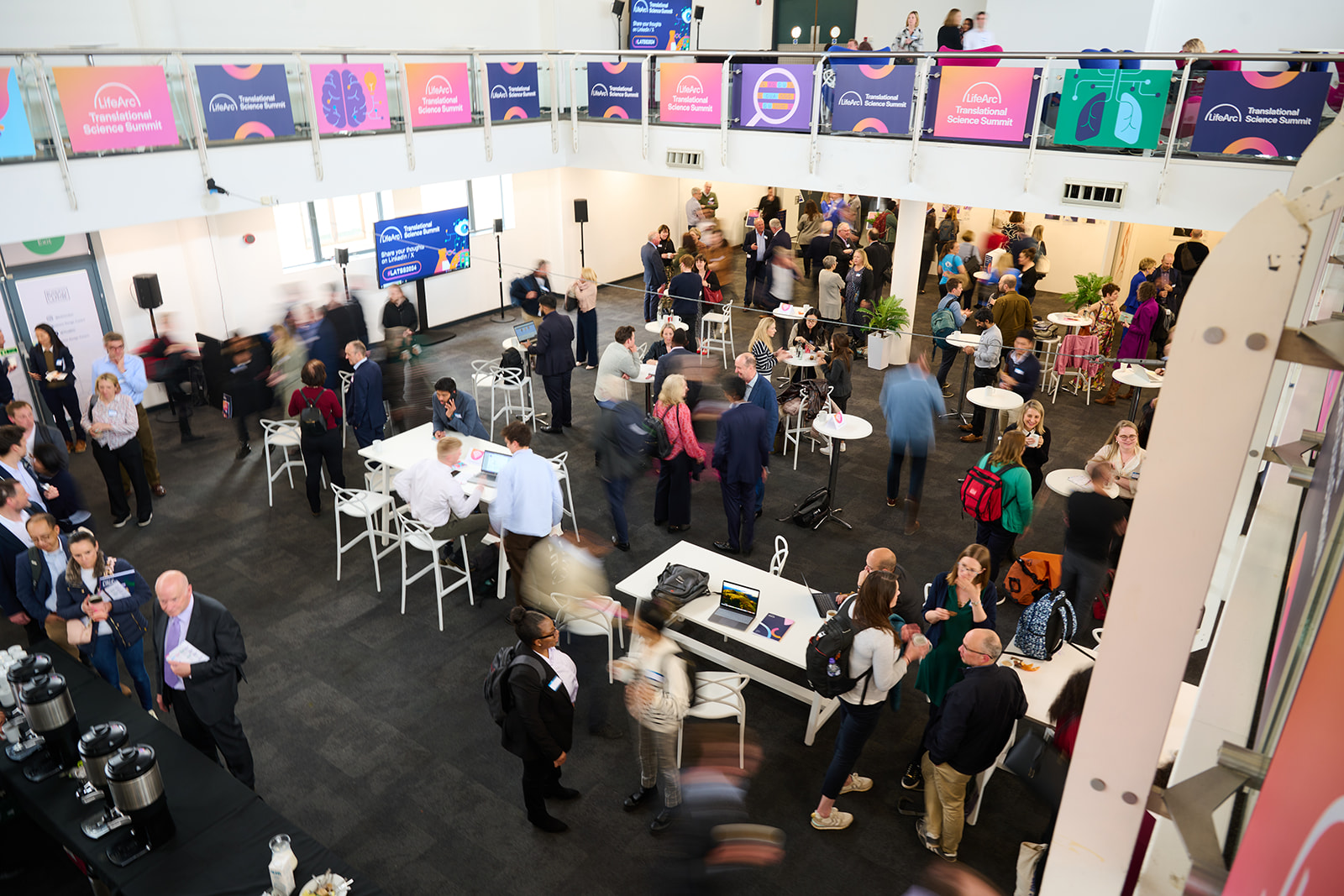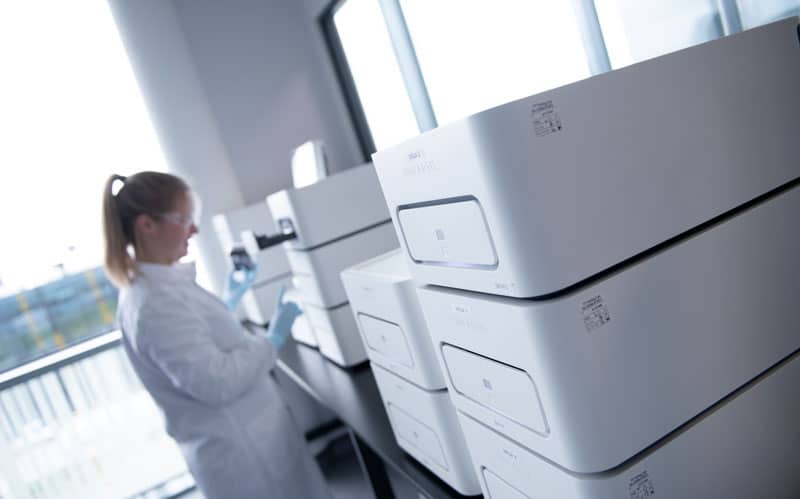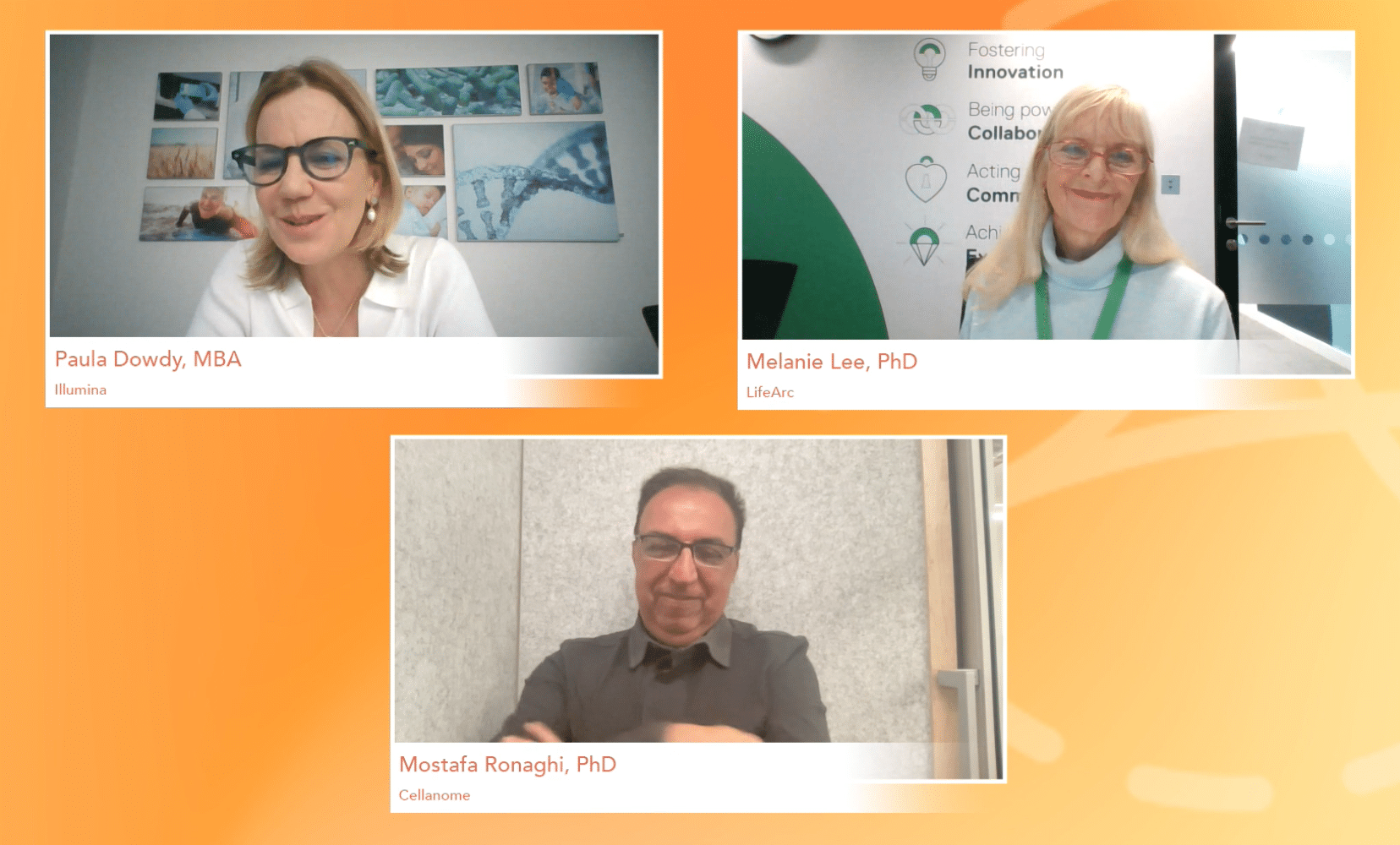The first ever LifeArc Translational Science Summit was a resounding success! Held on 23 April in London, the event brought together over 700 scientists, experts, policy makers and innovators to discuss all things translational science.
The day was filled with insightful and thought-provoking presentations from some of the biggest names in life sciences. It also provided an opportunity to showcase the important work LifeArc is doing to progress science and helped raise our profile in the field of translational science.
Here, we share some key insights and takeaways from the main sessions.
Collaboration is key
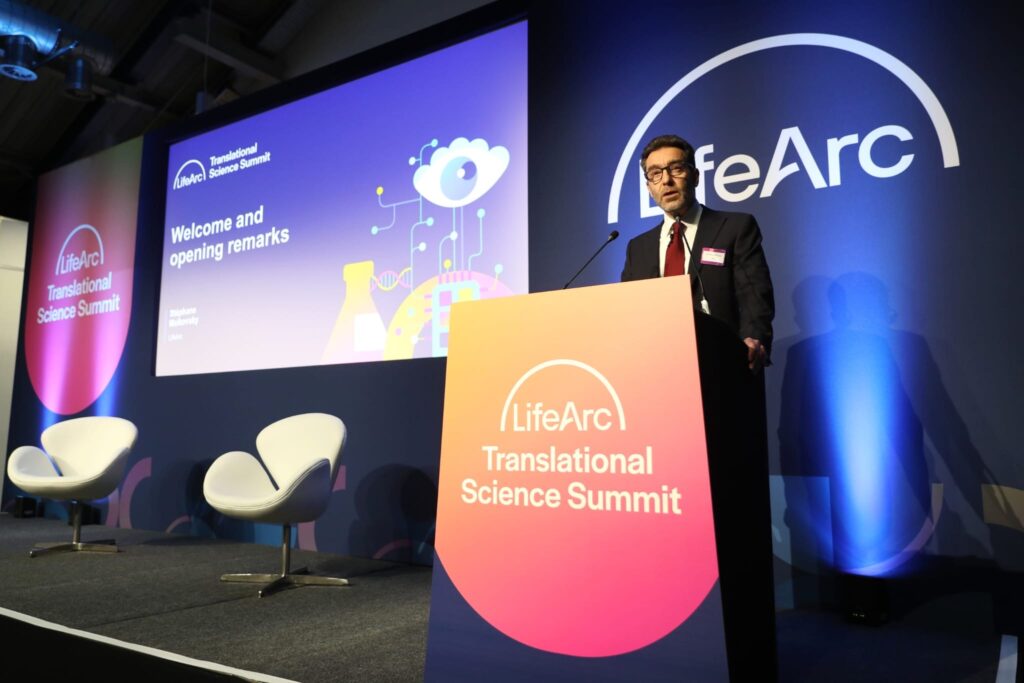
In the opening plenary, Interim CEO Stéphane Maikovsky outlined LifeArc’s mission to create life-changing impacts for patients and discussed our history and how we evolved to be where we are today, largely thanks to the monetisation of Keytruda (which you can read more about in our 2023 annual review).
Key takeaway:
- Collaboration and bringing people together from all disciplines is key for success. Only together can we make life sciences life changing.
Be bold, ambitious and innovative
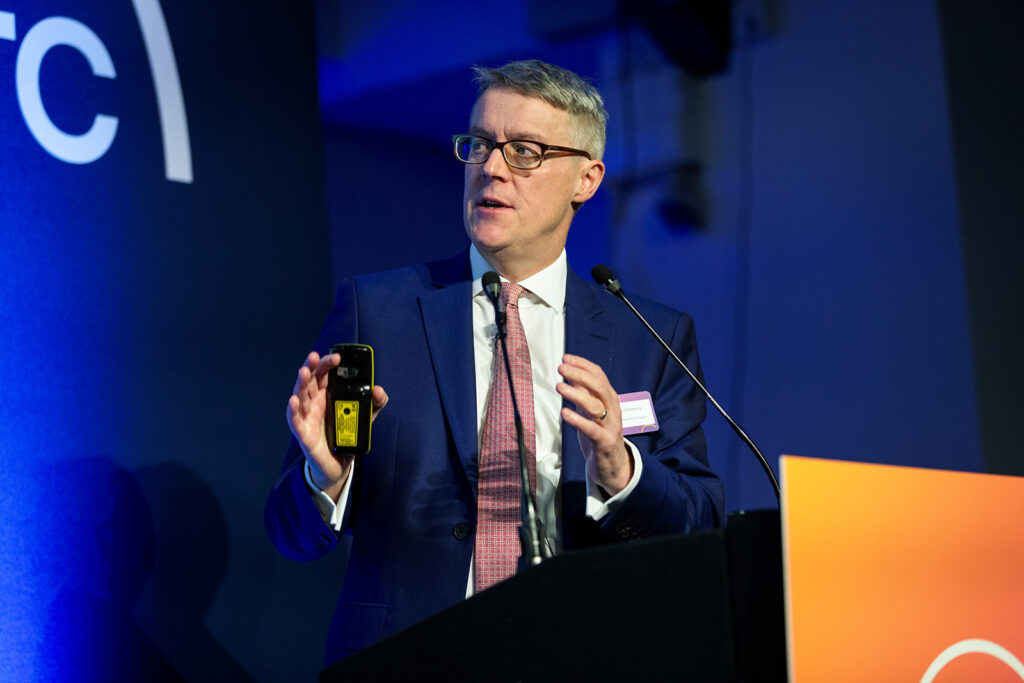
Professor Patrick Chinnery highlighted the necessity for collaboration within the life sciences ecosystem to drive innovations that significantly improve patient outcomes. He stressed that the complexity of healthcare challenges requires synergy among various organisations, and that cooperative efforts are essential for groundbreaking advancements in patient care.
Key takeaways:
- Collaboration is essential, particularly with industry because they still remain a key investor in UK research.
- Be bold, ambitious and innovative.
Getting regulation right is essential
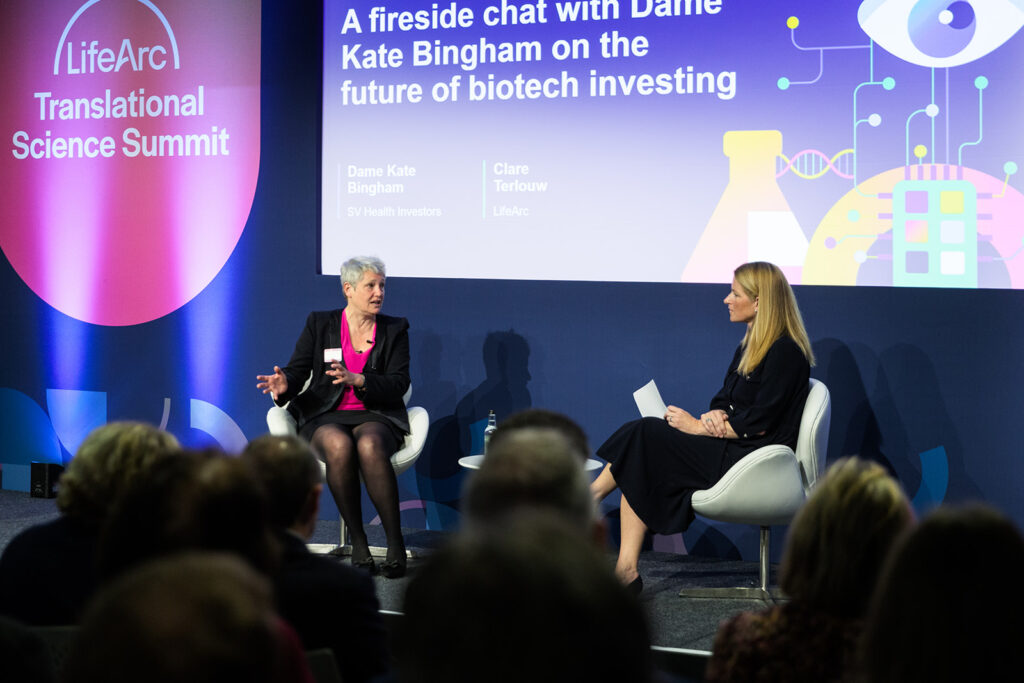
Dame Kate Bingham and Clare Terlouw, Head of LifeArc Ventures, explored the connection between SV health investors’ investment strategies and global translational research, the importance of growth capital and potential pension fund reforms, and their impact on the UK biotech sector’s competitiveness. Dame Kate Bingham also shared the lessons for the UK’s bioscience industry from her experience of leading the UK’s successful COVID-19 vaccine campaign.
Key takeaways:
- Take a portfolio approach and be prepared to abandon projects that are not working – “Don’t fall in love with your babies,” Dame Bingham advises.
- Set clear, explicit goals and assemble a core team with the right skills.
- The role of the Medicines and Healthcare products Regulatory Agency (MHRA) as a global leader in setting regulatory standards is key for future success. Regulators should adopt a collaborative and facilitating role, acting more as “air traffic control” than as restrictive “policemen.”
- The UK life sciences sector needs more than just financial investment from the government to succeed. It requires a better ecosystem for basic and translational research and regulatory processes to get innovations to patients quicker.
- We need to reduce hostility towards the private sector and be more open to working with industry, from which new products and innovations are likely to emerge.
The UK can become the go-to place for clinical trials
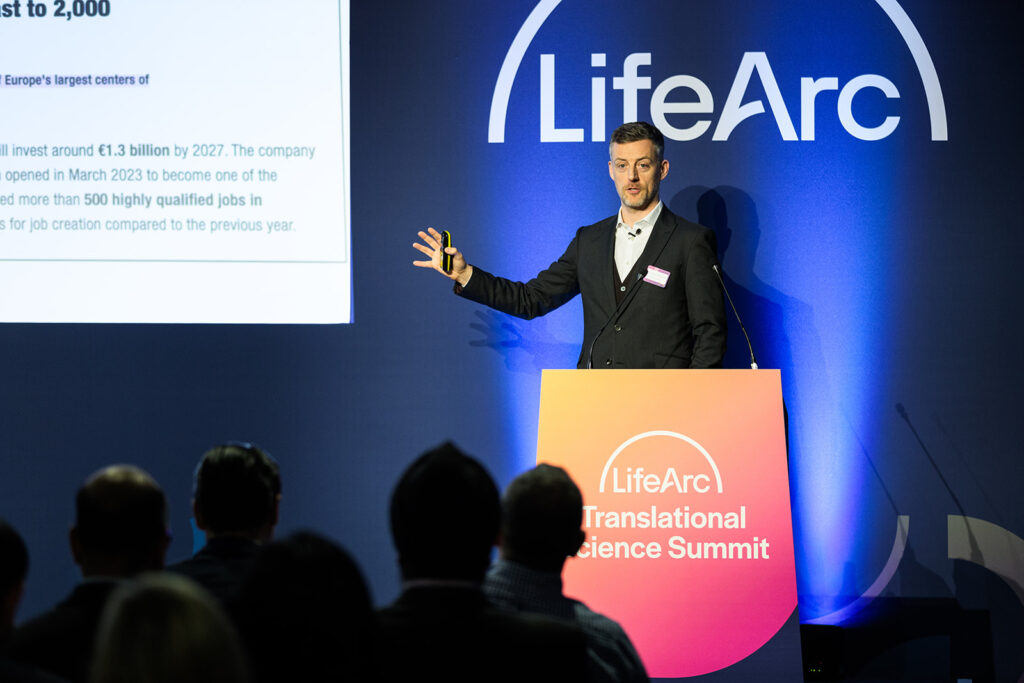
Lord James O’Shaughnessy reflected on the findings from the HM Government Review of Commercial Clinical Trials, noting that the UK had lost its global leadership in late-stage trials despite its historical strengths and strong performance during the pandemic. He discussed the significant costs of this decline for both patients and the health economy. Following the review, he examined changes in policy, practice, and outcomes, and considered what further actions are necessary for the UK to regain its status as a preferred global destination for industry-sponsored trials.
Key takeaways:
- In recent years, the UK has been falling behind other countries in trial activity – a 44% drop in the number of patients in trials between 2017 and 2022, and a drop from fourth in the world to tenth for trials started.
- This matters because it reduces the chances for patients in the UK to access innovative treatments, a lack of commercial research increases costs for the NHS, and impacts the UK as a desirable place for life science investment.
- To improve clinical trials in the UK, we should develop SMART metrics, streamline regulatory approvals, standardize contracting, enhance data transparency, set ambitious expansion targets, and introduce new KPIs to benchmark against global standards.
We need to unite to deliver impact for the patients

Dr Oni opened her talk emphasising the urgency for the rare disease community to unite for early intervention and prevention to combat kidney failure in children with rare diseases. She introduced the new LifeArc Kidney Research UK Centre for Rare Kidney Diseases, explaining how it is an exciting time for setting up the centre, with more therapeutics, collaborations, networks, and newborn screening programs available, and many UK children’s hospitals aligned in this effort.
Key takeaways:
- The new centre for rare kidney disease provides an opportunity to unite the rare disease ecosystem to transform rare diseases and reimagine research.
- Barriers in rare disease include a lack of inclusion, efficiency and equity.
- There is a deeply engrained culture in the medical profession of trying to protect children and there is some belief that clinical trials can cause harm.
- Children are excluded from research and clinical trials, so we need age inclusion.
- Processes are inefficient with over 20 years of fairly standard care. We need more focus on data/bridging datasets to change this.
- We need more fair care for children as they currently do not all receive the same standards of care due to inequalities in the UK.
- The focus on digital health is a struggle for some families – 4 in 10 households with children in the UK do not meet minimum digital living standard, with no access to digital technologies.
Fail to prepare, prepare to fail
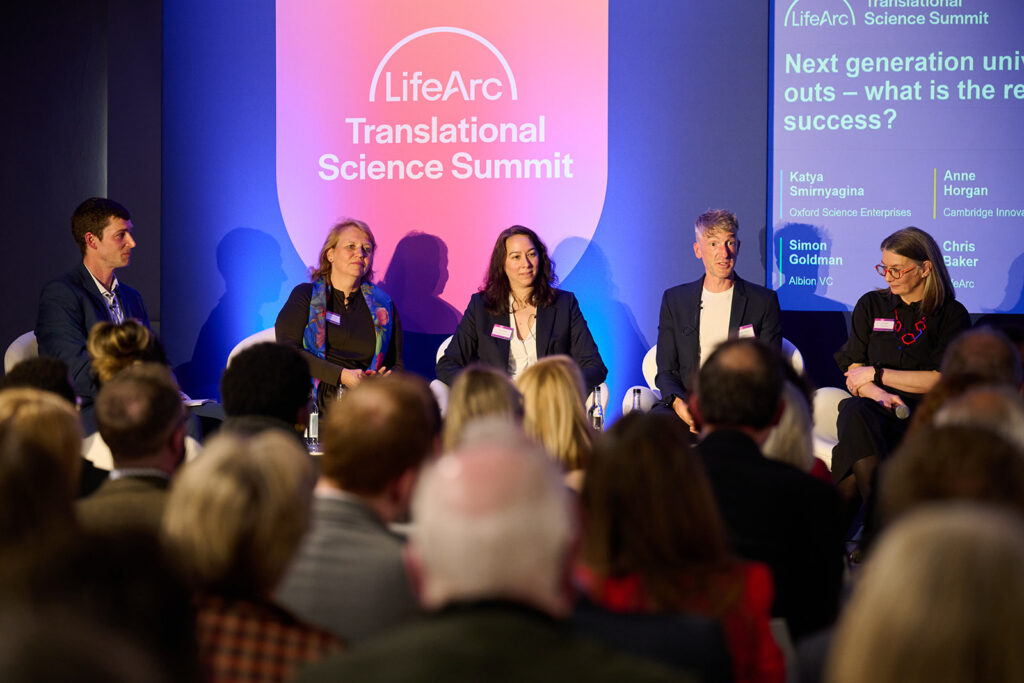
Packed sessions throughout the day showed just how interested attendees were in learning about navigating the funding landscape in life sciences. Topics ranged from surveying the current landscape and financing strategies for the future to university spin-outs and how life science accelerators can address the needs of smaller companies.
Key takeaways:
- Embrace feedback and rejections as learning opportunities to build resilience for future success in the competitive investment landscape.
- Prompt unified action is important in navigating industry challenges, such as changes to the UK’s R&D tax credits and the collapse of Silicon Valley Bank
- The UK has competitive advantages in the biotech sector, such as strong connectivity, a deep understanding of biology, and emerging leadership in integrating AI with biotechnology.
- Understanding what investors are looking for is crucial for startups. Entrepreneurs must be prepared to present strong pitches and demonstrate a clear understanding of the business aspects of their ventures.
- The investment landscape in Europe has matured, requiring more compelling and polished pitches compared to a decade ago. However, there is still a need to match the rapid development seen in U.S. biotech sectors.
- The panel advised aspiring life science entrepreneurs to persist despite initial investment rejections, be open to coaching, thoroughly research investors’ interests, focus on high-quality science with capable teams, maintain strong investor relationships, and align company goals with patient benefits for success.
Being proactive and pro-innovation can unleash UK life sciences
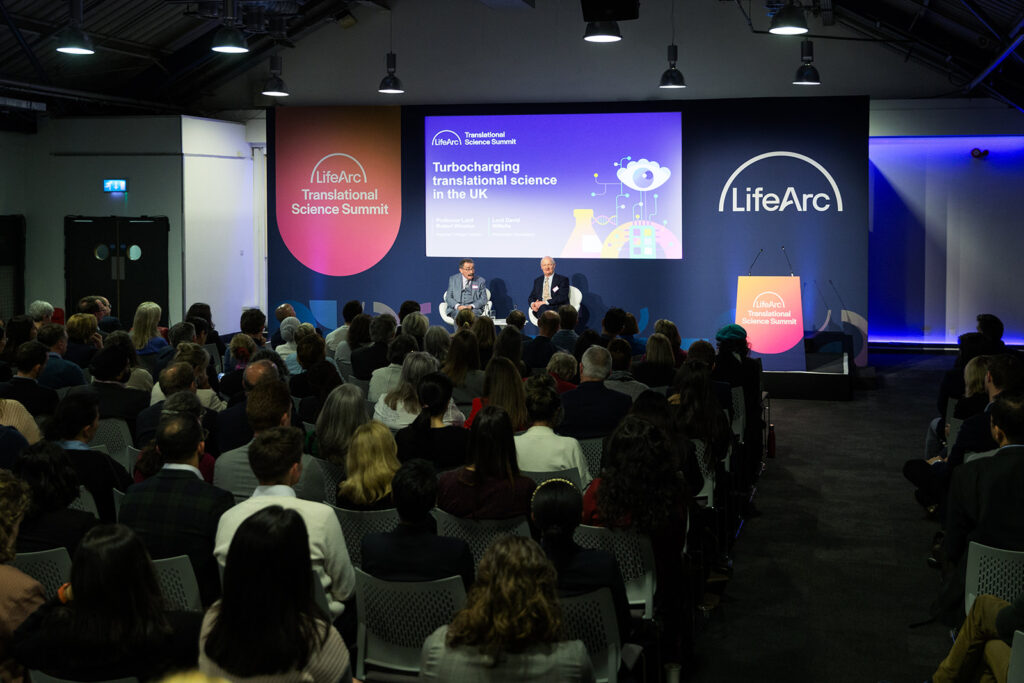
Professor Lord Robert Winston and Rt Hon Lord David Willetts discussed how to position the UK as a translational science superpower. They explored the current state of the life sciences sector, the challenges hindering major medical breakthroughs, the importance of international collaboration, and lessons from the development of the COVID vaccine.
Lord Winston emphasized the need for academics to be more proactive in commercialising their ideas rather than focusing solely on publishing papers. Lord Willetts highlighted the necessity for the NHS to adopt a more pro-innovation stance to allow patients quicker access to innovative treatments.
These are just a few snippets from a jam-packed day! If you missed any of the sessions or want to revisit them, they will be available to watch online soon.
We’d like to thank all of our amazing speakers and attendees for making LATSS such a success! Until next time!
Media contact
Hannah Severyn
Head of Media and PR at LifeArc

